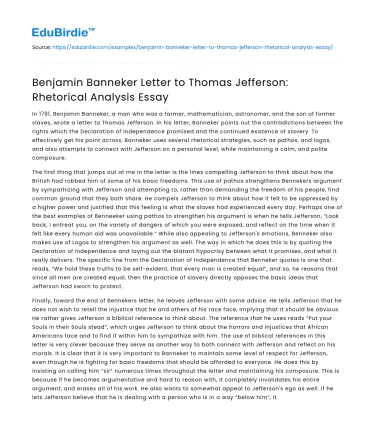In 1791, Benjamin Banneker, a man who was a farmer, mathematician, astronomer, and the son of former slaves, wrote a letter to Thomas Jefferson. In his letter, Banneker points out the contradictions between the rights which the Declaration of Independence promised and the continued existence of slavery. To effectively get his point across, Banneker uses several rhetorical strategies, such as pathos, and logos, and also attempts to connect with Jefferson on a personal level, while maintaining a calm, and polite composure.
The first thing that jumps out at me in the letter is the lines compelling Jefferson to think about how the British had robbed him of some of his basic freedoms. This use of pathos strengthens Bennekers argument by sympathizing with Jefferson and attempting to, rather than demanding the freedom of his people, find common ground that they both share. He compels Jefferson to think about how it felt to be oppressed by a higher power and justified that this feeling is what the slaves had experienced every day. Perhaps one of the best examples of Benneeker using pathos to strengthen his argument is when he tells Jefferson, “Look back, I entreat you, on the variety of dangers of which you were exposed, and reflect on the time when it felt like every human aid was unavailable.” While also appealing to Jefferson's emotions, Benneker also makes use of Logos to strengthen his argument as well. The way in which he does this is by quoting the Declaration of Independence and laying out the blatant hypocrisy between what it promises, and what it really delivers. The specific line from the Declaration of Independence that Benneker quotes is one that reads, “We hold these truths to be self-evident, that every man is created equal”, and so, he reasons that since all men are created equal, then the practice of slavery directly opposes the basic ideas that Jefferson had sworn to protect.
Save your time!
We can take care of your essay
- Proper editing and formatting
- Free revision, title page, and bibliography
- Flexible prices and money-back guarantee
Finally, toward the end of Bennekers letter, he leaves Jefferson with some advice. He tells Jefferson that he does not wish to retell the injustice that he and others of his race face, implying that it should be obvious. He rather gives Jefferson a biblical reference to think about. The reference that he uses reads “Put your Souls in their Souls stead”, which urges Jefferson to think about the horrors and injustices that African Americans face and to find it within him to sympathize with him. The use of biblical references in this letter is very clever because they serve as another way to both connect with Jefferson and reflect on his morals. It is clear that it is very important to Banneker to maintain some level of respect for Jefferson, even though he is fighting for basic freedoms that should be afforded to everyone. He does this by insisting on calling him “sir” numerous times throughout the letter and maintaining his composure. This is because if he becomes argumentative and hard to reason with, it completely invalidates his entire argument, and erases all of his work. He also wants to somewhat appeal to Jefferson's ego as well. If he lets Jefferson believe that he is dealing with a person who is in a way “below him”, it gives Benneker a better chance to actually be listened to instead of merely being brushed aside.
To conclude, Benneker argues his position on slavery with several rhetorical devices, such as pathos and logos, while at the same time keeping himself in check, and using politeness wherever he could. The use of these rhetorical strategies when combined serves to strengthen Bennekers argument and present himself as someone who is credible, and respectable.






 Stuck on your essay?
Stuck on your essay?

